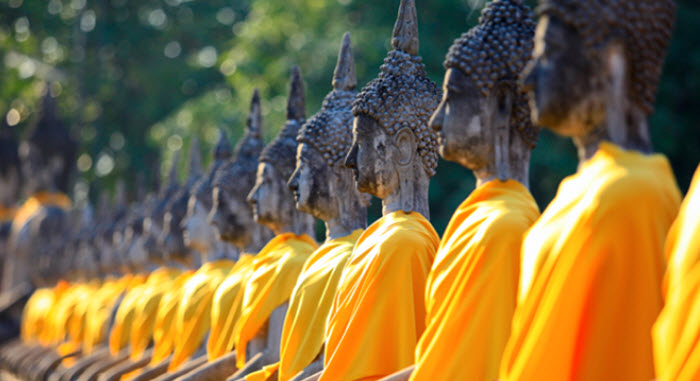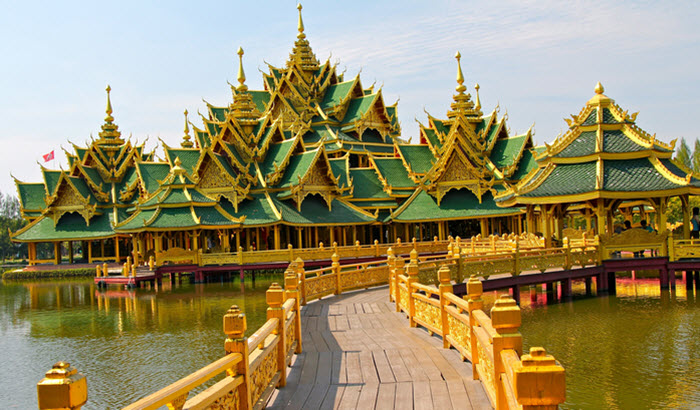Thailand

The Kingdom of Thailand comprises the center of the Indochine peninsula in Mainland Southeast Asia. Thailand is bordered by four different countries: Laos, Cambodia, Malaysia and Burma / Myanmar. The southernmost part of the country has a coastline to the Andaman Sea to the west and the Gulf of Thailand to the east and south.
Thailand is a constitutional monarchy where King Rama IX (Bhumibol Adulyadej) has reigned since 1946. His exceptionally long reign makes Rama IX the longest-serving head of state of all the world’s current head of states. King Rama IX is the ninth monarch of the Chakri Dynasty.
The leading sectors of the Thai economy are manufacturing, agriculture, and tourism. The hospitality industry grew significantly during the Vietnam War when U.S. soldiers were sent on short trips to Thailand to rest and recuperate. The manufacturing sector began to gain traction much later, and Thailand is considered a newly industrialized economy. Today, Thailand exports over 100 billion USD worth of goods and services annually and exports account for more than two-thirds of the nation’s gross domestic product. Examples of major exports are rice, textiles, and footwear.
Thailand is predominantly a country with a tropical savanna climate (also known as wet and dry climate), but the southernmost part of the country has a tropical monsoon climate, and this is also true for the eastern tip of eastern Thailand.
In parts of Thailand that enjoy a tropical monsoon climate, daytime temperatures normally exceed 30 degrees C year round, even during the monsoon. The monsoon season brings a lot of rainfall but doesn’t make the weather cold.
For the rest of Thailand, the differences between the seasons are more noticeable temperature wise. There is a cool dry season, a hot dry season and a rainy season. At higher altitudes, it is not uncommon for the temperature to drop down to near freezing at night during the most severe part of the cool dry season.
Basic information about Thailand
| Capital | Bangkok |
| Largest city | Bangkok |
| Official language | Thai |
| Majority religion | Theravada Buddhism |
| Currency | Baht (฿) (THB) |
| Drives on the | Left |
| Area | 198,115 sq mi |
| Population | Approximately 70 million (2015 estimate) |
| Time zone | ICT (UTC +7) |
| Prostitution | Prostitution is illegal but widespread. All prostitution has been illegal since 1960. |
| Gambling | Gambling is not legal in Thailand. There are two exceptions to this rule. The government-sponsored Thai lottery and horse racing There are a lot of illegal casinos in the country. |
| Binary Options | Thailand has no regulation regarding binary options. Binary options are openly advertised and Thai citizens are allowed to open accounts with foreign binary options brokers that accept Thai accounts. Thai citizens are allowed to deposit funds to these accounts under the Bank of Thailand’s forex regulations. It is therefore likely that the Thai government equate binary options with Forex trading that is legal in Thailand. |
| Calling code | +66 |
| Internet TLD | .th
.ไทย
|
Public holidays in Thailand
In an average year, there are 16 public holidays in Thailand, including the three-day long Thai New Year’s holiday. The cabinet has the authority to declare additional public holidays.
Most public holidays are observed by both the public and private sectors. If a holiday falls on a weekend, one following workday will be a compensatory holiday for workers.
| Thai name (transcribed) | English name | When? | Information |
| Wan Khuen Pi Mai | New Year’s Day | 1 January | Celebrates the start of the Gregorian calendar year. |
| Magha Puja
Wan Makha Bucha |
Makha Bucha Day
|
Full Moon of the 3rd Thai lunar month (February*) | Commemorates Buddha’s teaching of Ovada Patrimokkha. |
| Wan Chakkri | Chakri Dynasty Memorial Day
King Phutthayotfa Chulalok the Great Day |
6 April | Commemorates the establishment of the Chakri Dynasty and the founding of Bangkok. |
| Wan Songkran
April 13: Wan Maha Songkran
April 14: Wan Nao
April 15: Wan Thaloeng Sok
|
Songkran Festival Thai New Year’s FestivalThe second day of the New Year’s celebration is Family Day. |
13–15 April | Thai New Year Celebration |
| Wan Raeng Ngan Haeng Chat | National Labour Day | 1 May | Coincides with International Workers’ Day. |
| Wan Chattra Mongkhon | Coronation Day | 5 May | Celebrates the coronation of King Bhumibol Adulyadej. |
| Wan Wisakha Bucha | Vesak
Buddha Purnima
Buddha Day |
Full moon of the 6th Thai lunar month
(May*) |
Commemorates the birth, enlightenment and passing of the Buddha.
Also observed as National Tree Day. |
| Wan Asanha Bucha | Asalha Puja
Dharma Day |
Full moon of the 8th Thai lunar month (July*) | Commemorates Buddha’s first discourse, the Dhammacakkappavattana Sutta. |
| Wan Khao Phansa | Beginning of Vassa
Beginning of Rains Retreat
Beginning of Buddhist Lent |
First waning moon of the 8th Thai lunar month (July*) | Buddhist observance marking the beginning of Vassa. |
| Wan Chaloem Phra Chonmaphansa Somdet Phra Nang Chao Phra Boromma Rachini Nat | Queen’s Birthday | 12 August | Celebrates the birthday of Queen Sirikit.
Also observed as National Mother’s Day (Wan Mae Haeng Chat) |
| Wan Ok Phansa | Last day of Vassa
Last day of Rains Retreat
Last day of Buddhist Lent |
Full moon of the 11th Thai lunar month | Buddhist observance marking the end of Vassa. |
| Wan Piya Maharat | King Chulalongkorn Day | 23 October | Commemorates the passing of King Chulalongkorn. |
| Wan Chaloem Phra Chonmaphansa Phra Bat Somdet Phra Chao Yu Hua | King’s Birthday
|
5 December | Celebrates the birthday of King Bhumibol Adulyadej.
Also observed as National Day and National Father’s Day. |
| Wan Rattha Thammanun | Constitution Day | 10 December | Celebrates the promulgation of the first permanent constitution in 1932. |
| Wan Sin Pi | New Year’s Eve | 31 December | Celebrates the end of the Gregorian calendar year. |
* The Gregorian month in which this holiday normally falls. In lunar leap years, the holiday takes place one month later.

Bank holidays, National observances, and Other observances
In addition to the public holidays listed above, there are national observances, other observances and bank holidays. The bank holidays are observed by financial institutions and regulated by the Bank of Thailand. National observances are regulated by the Thai government but not observed as national holidays. One example of such a day is National Children’s Day, which falls on the second Saturday of July and is widely celebrated by governmental agencies who arrange on a lot of different activities for children on this day.
Other observances are not regulated by the government and the extent to which they are celebrated can vary a lot from one part of the country to another, and also between different groups and communities throughout the country. The mid-year festival Wan Sat Thai is for instance mostly celebrated in Nakhon Si Thammarat, while Christmas is celebrated by Christian communities and also celebrated commercially in areas with a lot of foreign presence from countries where December 25 is an important midwinter celebration even for non-Christians.

